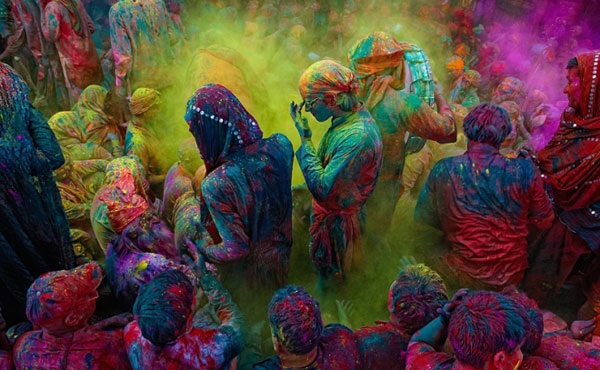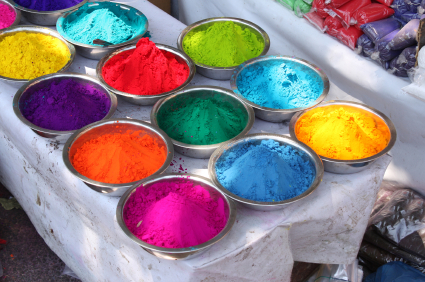 Spring has arrived and the flowers are in bloom. To mark the end of the bitter winter, the people of the Indian subcontinent celebrate Holi, the Festival of Color. To relish in the changing of seasons, town centers and markets become a swarm of activity. Tesu and Palash, flowers of the region, are gathered to make the abundance of colors set out, and children in particular grab these pigments in droves and begin to literally paint the town and everyone in it. Surely a sight to behold, the celebration entails the throwing of the colors into the masses.
Spring has arrived and the flowers are in bloom. To mark the end of the bitter winter, the people of the Indian subcontinent celebrate Holi, the Festival of Color. To relish in the changing of seasons, town centers and markets become a swarm of activity. Tesu and Palash, flowers of the region, are gathered to make the abundance of colors set out, and children in particular grab these pigments in droves and begin to literally paint the town and everyone in it. Surely a sight to behold, the celebration entails the throwing of the colors into the masses.
This Hindu festival was originally called "Holika," and traces back to early religious texts. Though the meaning has certainly changed over the ages, it has always been a joyous occasion. Initially, married women sought blessings on their families and worshiped the full moon. Like many religious holidays, including upcoming Easter, the position of the moon determines the date of celebration, although the focus has shifted away from a lunar event to what comes after it: Spring!
According to legend, the demon king Hiranyakashyap demanded everyone to worship only him, yet his son Prahlad would not, and remained good. In retaliation, the demon king commanded his sister, Holika, to take Prahlad into a great fire. Holika had a boon whereby she could not be burned in the fire, but unknown to her, this was only if she entered alone. Thus Holika burned, yet the god saved Prahlad for his devotion hence the celebration of good over evil, life over death, Spring over Winter.
 Every year, Indians prepare by creating an effigy of Holika and burning it on a great bonfire. The next day is the festival of colors. Holi has great social and cultural significance, as though it is a Hindu holiday, everybody joins in the celebrations. Even enemies agree to set aside their differences for the day and join together. The distinction of classes is temporarily dissolved; richness and poverty no longer separate individuals.
Every year, Indians prepare by creating an effigy of Holika and burning it on a great bonfire. The next day is the festival of colors. Holi has great social and cultural significance, as though it is a Hindu holiday, everybody joins in the celebrations. Even enemies agree to set aside their differences for the day and join together. The distinction of classes is temporarily dissolved; richness and poverty no longer separate individuals.
Friends and families visit that night to enjoy sweets and drinks, as well as exchange gifts. Many local groups here in the United States put on events to mark Holi where you can join in the festivities and learn about Hindu culture. The ULC Ministries welcomes and ordains people of all faiths, and we encourage our ministers to seek new spiritual experiences and connect with the global community, particularly if you wish to properly earn a doctorate of Divinity.
The message behind Holi is welcoming, and reinforces the Ministries's edict to do that which is right. Even if you are not Hindu, the triumph of light over dark, and enjoying fun with your friends and family are worthwhile causes. So get ordained, grab a handful of pigments, step outside into the sun with loved ones, and give this celebration a try!
Sources: Seattle Post-Intelligencer, Wikipedia,



